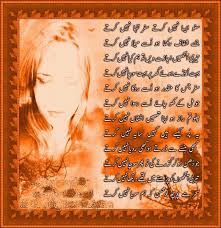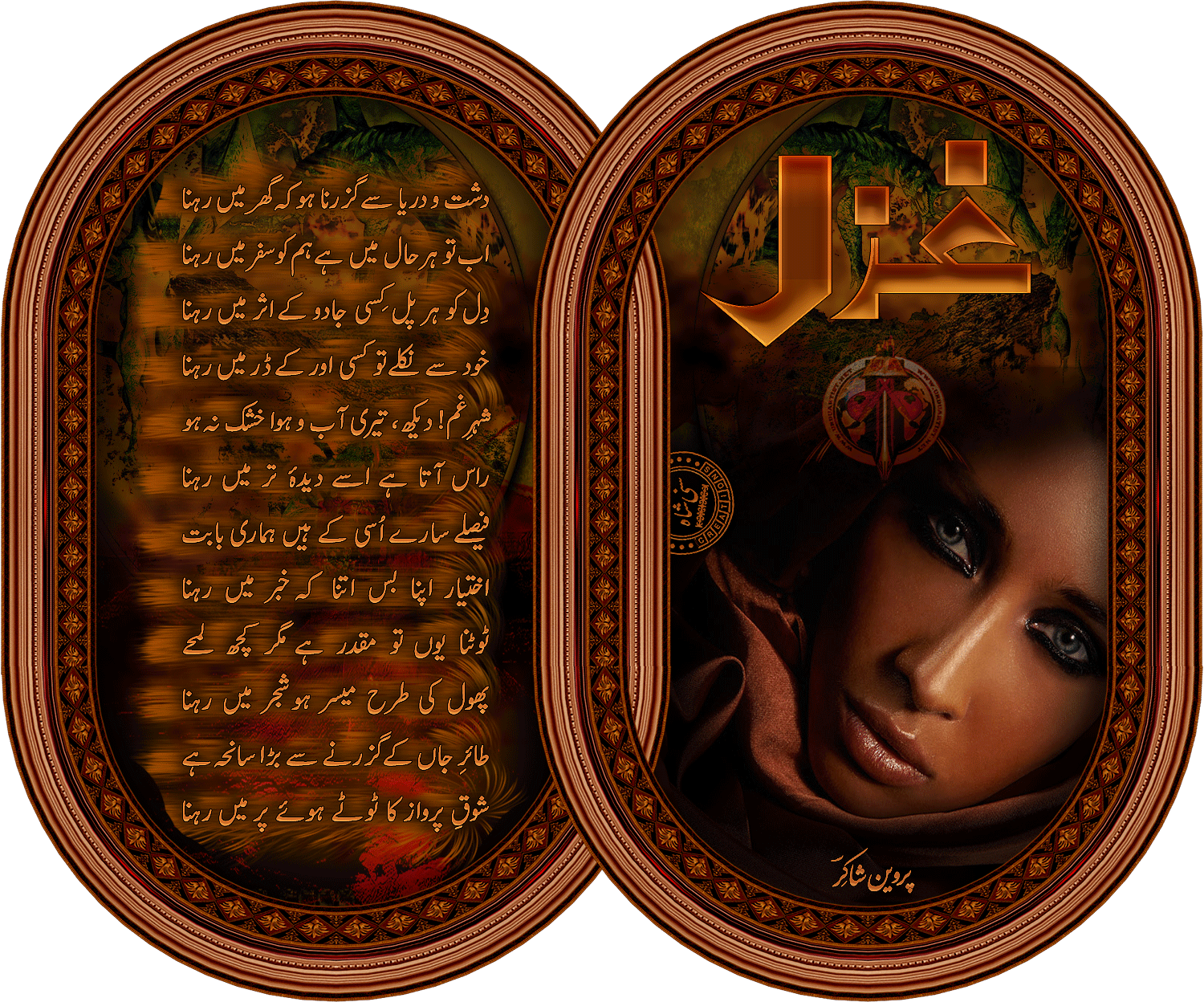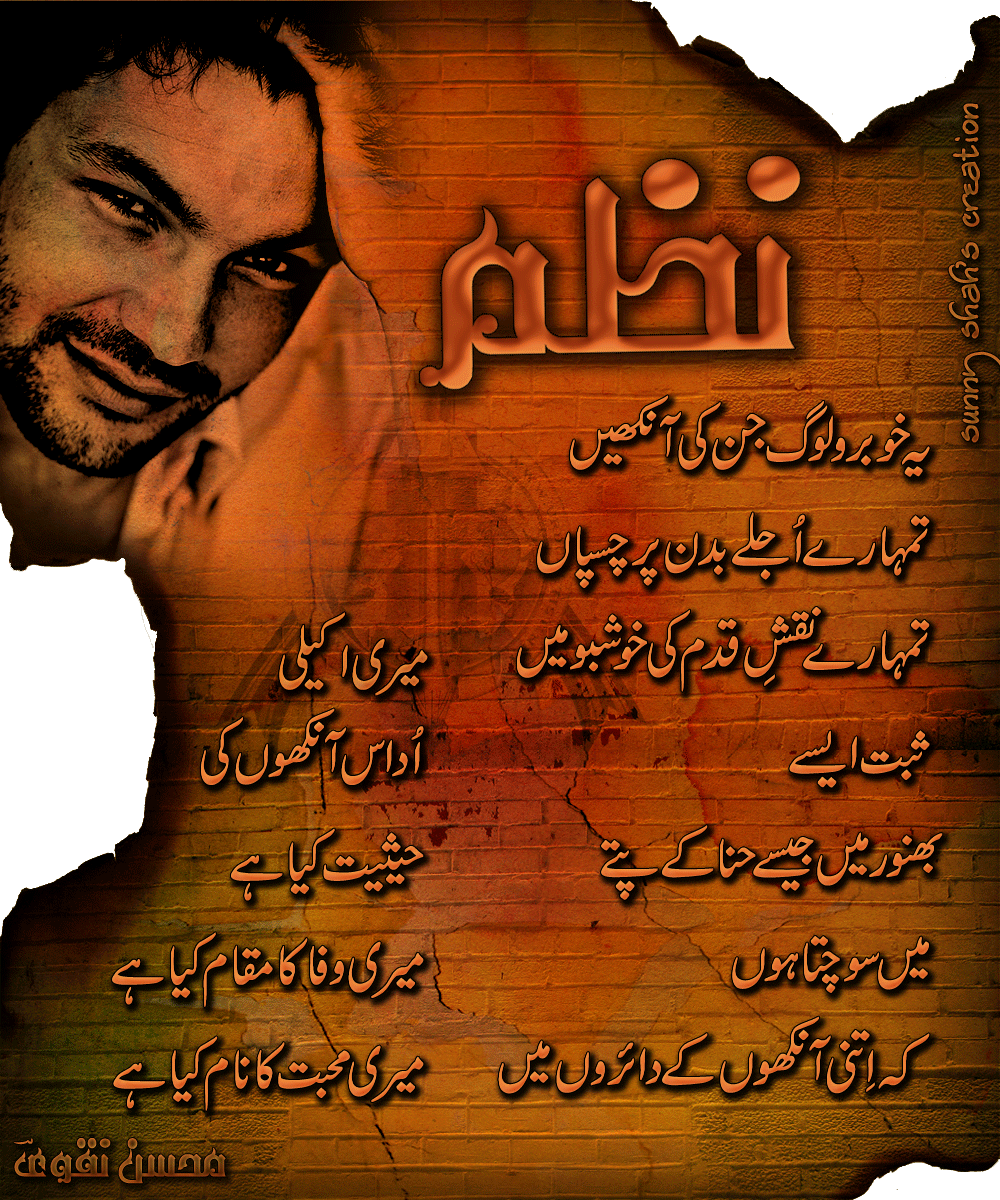Urdu Poetry With Images Biography
Source (google.com.pk)
The principal forms of Urdu poetry are:
Ghazal, is a set of two liner couplets, which strictly should end with the same rhyme and should be within one of the predefined meters of Ghazals.There has to be minimum of five couplets to form a Ghazal. Couplets may or may not have same thought. It is one of the most difficult forms of poetry as there are many strict parameters that one needs to abide by while writing Ghazal.
Hamd is a poem in praise of Allah. The word "hamd" is derived from the Qur'an, its English translation is "Praise".
Marsiya (or elegy), is nearly always on the death of Hasan and Husain and their families, but occasionally on the death of relatives and friends. It is usually in six-lined stanzas with the rhyme aaaabb. The recitation of these elegies in the first ten days of Muharram is one of the greatest event in Muslim life. A fully developed marsiya is always an epic. The famous marsia writers who inherited the tradition of Mir Anis among his successive generations are Mir Nawab Ali 'Munis', Dulaha Sahab 'Uruj', Mustafa Meerza urf Piyare Sahab 'Rasheed', Syed Muhammad Mirza Uns, Ali Nawab 'Qadeem', Syed Sajjad Hussain "Shadeed" Lucknavi, Allama, Dr.Syed Ali Imam Zaidi, "Gauher" Luckhnavi the(great grandson of Mir Babber Ali Anis).
Masnavi, in the majority of cases a poetic romance. It may extend to several thousand lines, but generally is much shorter. A few masnavis deal with ordinary domestic and other occurrences. Mir and Sauda wrote some of this kind. They are always in heroic couplets, and the common metre is bacchic tetrameter with an iambus for last foot. The Religious masnavi History of Islam (Tarikh-e-Islam Az Quran) written by Dr. Syed Ali Imam Zaidi Gauher Lucknavi.
Naat is a poetry that specifically praises the Islamic prophet Muhammad.
Nazm Urdu nazm is a major part of Urdu poetry. From Nazeer Akarabadi, Iqbal, Josh, Firaq, Akhtarul Iman to down the line Noon Meem Rashid, Faiz, Ali Sardar Jafri and Kaifi Azmi. They have covered common life, philosophical thinking, national issues and the precarious predecament of individual human being.As a distinct form of Nazm many Urdu poets influenced by English and other European poets took to writing sonnets in Urdu language. Azmatullah Khan (1887-1923) is believed to have introduced this format to Urdu Literature. The other renowned Urdu poets who wrote sonnets were Akhtar Junagarhi, Akhtar Sheerani, Noon Meem Rashid, Zia Fatehabadi, Salaam Machhalishahari and Wazir Agha.
Qasida, a kind of ode, often panegyric on a benefactor, sometimes a satire, sometimes a poem dealing with an important event. As a rule it is longer than ghazal, but it follows the same system of rhyme.
Qawwali, is a form of Urdu poetry read along with devotional music, A Qawwali is almost always dedicated to particular Sufi.
Shayari, a beautiful musical form of Urdu poetry allows a person to express the deepest feelings through words. It lets you explain sentiments in all their forms through rhythmic words.
Ruba'i, is a poetry style, the Arabic term for "quatrain". The plural form of the word, rubāʿiyāt, often anglicised rubaiyat, is used to describe a collection of such quatrains.
Tazkira, biographical anthology, almost always of poetry alone. This is often a mere collection of names with a line or two of information about each poet, followed by specimen of his composition. On the other hand it may be the history of Urdu poetry with copious illustrative extracts. The best tazkiras give biographical details, but fail in literary criticism, and we get little idea of style or poetical power, still less of contents of poems. Even the large anthologies do not systematically review an author's work. Most of them have the names in alphabetical order, but one or two prefer historical order. The majority quote only lyrics, and the quotations, usually chosen at random, do not illustrate poetry.
Urdu poetry forms itself with following basic ingredients:
Bait (بیت)
Bait-ul-Ghazal (بیت الغزل)
Beher (بحر)
Diwan (دیوان)
Husn-E-Matla (حسنِ مطلع)
Kalam (کلام)
Kulyat (کلیات)
Maqta (مقطع)
Matla (مطلع)
Mavra (ماوراء)
Misra (مصرع)
Mushaira (مشاعرہ)
Qaafiyaa (قافیہ)
Radif (ردیف)
Sher (شعر)
Shayar (شاعر)
Shayari (شاعری)
Tah-Tul-Lafz (تحت اللفظ)
Takhallus (تخلص)
Tarannum (ترنم)
Triveni (تریوینی)
The major genres of poetry found in Urdu are:
Doha (دوہا)
Fard (فرد)
Geet (گیت)
Ghazal (غزل), as practiced by many poets in the Arab tradition. Mir, Ghalib, Dagh are well-known composers of ghazal.
Hamd (حمد)
Hazal (ہزل)
Hijv (ہجو)
Kafi (کافی)
Madah (مدح)
Manqabat (منقبت)
Marsia (مرثیہ)
Masnavi (مثنوی)
Munajat (مناجات)
Musaddas (مسدس)
Mukhammas (مخمس)
Naat (نعت)
Nazm (نظم)
Noha (نوحہ)
Qasida (قصیدہ)
Qat'ã (قطعہ)
Qawwali (قوالی)
Rubai (رباعی) (a.k.a. Rubayyat or Rubaiyat) (رباعیات)
Salam (سلام)
Sehra (سہرا)
Shehr a'ashob (شہر آشوب)
Soz (سوز)
Wasokht (وسوخت)
Urdu Poetry With Images


Urdu Poetry With Images


Urdu Poetry With Images

Urdu Poetry With Images


Urdu Poetry With Images


Urdu Poetry With Images


Urdu Poetry With Images


Urdu Poetry With Images


Urdu Poetry With Images


Urdu Poetry With Images


Urdu Poetry With Images
No comments:
Post a Comment